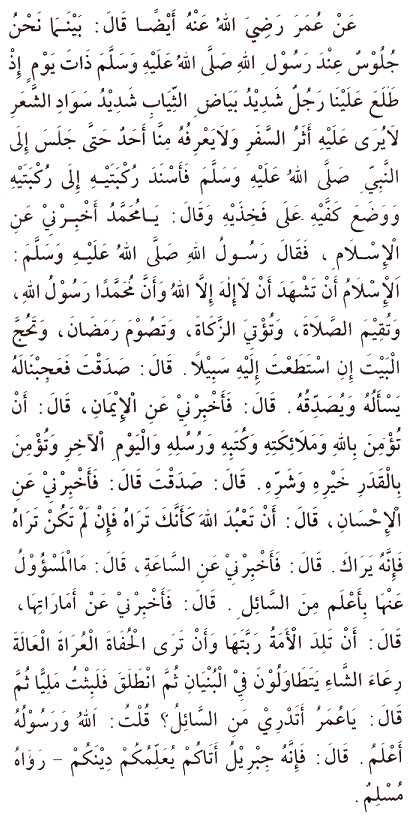Also on the authority of `Umar (radi Allaahu ‘anhu), who said:
| “One day while we were sitting with the Messenger of Allaah (sallAllaahu alayhi wa sallam) there appeared before us a man whose clothes were exceedingly white and whose hair was exceedingly black; no signs of journey were to be seen on him and none of us knew him. He walked up and sat down in front of the Prophet (sallAllaahu alayhi wa sallam), with his knees touching against the Prophet’s (sallAllaahu alayhi wa sallam) and placing the palms of his hands on his thighs he said: “O Muhammad, tell me about Islaam.”The Messenger of Allaah (sallAllaahu alayhi wa sallam) said: “Islaam is to testify that there is no deity worthy of worship but Allaah and Muhammad is the Messenger of Allaah, to perform prayers, to give zakaah, to fast in Ramadaan, and to make the pilgrimage to the House if you are able to do so.”He said: “You have spoken rightly”; and we were amazed at him asking him and saying that he had spoken rightly.He (the man) said: “Tell me about Eemaan.”He (the Prophet, sallAllaahu alayhi wa sallam) said: “It is to believe in Allaah, His Angels, His Books, His Messengers, and the Last Day, and to believe in divine destiny (qadr), both the good and the evil of it.”He said: “You have spoken rightly.”He (the man) said: “Then tell me about Ihsaan.”He (the Prophet, sallAllaahu alayhi wa sallam) said: “It is to worship Allaah as though you see Him, and if you do not see Him, then (knowing that) truly He sees you.”He said: “Then tell me about the Hour.”He said: “The one questioned about it knows no better than the questioner.”He said: “Then tell me about its signs.”He said: “That the slave-girl will give birth to her mistress, and that you will see barefooted, naked destitute shepherds competing in constructing lofty buildings.”Then he (the man) left, and I stayed for a time. The he (the Prophet, sallAllaahu alayhi wa sallam) said: “O `Umar, do you know who the questioner was?”I said: “Allaah and His Messenger know best.”He said: “It was Jibreel, who came to teach you your religion.”It was related by Muslim |
Brief Commentary
- This Hadith is called أم السنة (the mother of the Sunnah), just like Surah Al-Fatiha is called أم الكتاب (the mother of the book)
- Some scholars say the first hadith (hadith 1. Intentions) is like “بسم الله الرحمن الرحيم” and this hadith is like Surah Al-Fatiha
- The prophet (sallaAllahu ‘alayhi wasallam) ended the hadith by saying Jibreel came to teach us our religion. By this he means our religion in all aspects
- This incident (hadith) took place towards the end of the prophet’s (sallaAllahu ‘alayhi wasallam) life, hence it may be said that Jibreel was sent to summarise the message via this hadith
- As Jibreel came to teach us our religion in all aspects, this also includes teaching us about the etiquettes of seeking knowledge and this was done by the manner Jibreel was conducting himself with the prophet (sallaAllahu ‘alayhi wasallam)
- Knowledge is worship hence it needs the three I’s discussed previously:
- Iman: We need to have the fear of Allah when studying or teaching Islamic knowledge
- Ikhlas: We need to be seeking knowledge solely for the sake of Allah
- Ittiba’: We need to study the knowledge that is based upon the teachings of the prophet (sallaAllahu ‘alayhi wasallam)
- Scholars used to learn manners as they would learn Islamic knowledge
- The actual meaning of Islam is submission, not peace
- Iman comprises of three components:
- Belief in the heart
- Statement of the tongue
- Actions of the limbs
- Ibn Taymiyyah said “There is nothing more beloved to a pure and sound heart other than Allah”
- Iman increases and decreases as in Surah Al-Anfal, [8:2]
Benefits and action points:
- Manners of seeking knowledge:
- Dress in the best of clothes
- Sit quietly
- Come close enough to pay attention and understand everything from the teacher
- Ask questions in a good manner; concise, simple, relevant questions
- Memorise well
- Apply what is learnt
- Only teach what you are sure and certain of
- Etiquettes of a seeker of knowledge:
- Leave pride and arrogance
- Beware of falling into the doubtful/unclear issues
- Adorn yourself with manners and honour
- Avoid the gatherings of vain speech
- Avoid haste. Do not come to conclusions quickly
- Perfect the foundations before expanding further in your studies
- Etiquettes with your teacher:
- Do not precede him in speech or actions
- Avoid extensive/persistent questioning
- Do not call him by his name
- Do not allow small mistakes to degrade your teacher in your eyes
- Write what it taught and pay attention to it
- Manners with the knowledge:
- Revise, memorise and act upon it
- Seek what is beneficial and leave what is not
- Make du’aa to Allah for He is the owner of all knowledge
- Do not hesitate to say ‘I don’t know’. If half of knowledge is ‘I don’t know’ then half of ignorance is answering what you are unsure of
- Be precise and accurate
- Take some time to relax. Constantly seeking knowledge will make you bored and inattentive
- Live between the Qur’an and the Sunnah
- Be complete in what you learn and do not steal from the knowledge (studying certain parts whilst leaving out others)
- Signs of beneficial knowledge:
- Humility
- Concern with what benefits
- Fear of Allah
- Concise speech
- Thinking oneself to be less than others
- No desire to overcome or lead, to appear better, or to be famous
The commentary on the pillars of Islam will be done on the 3rd hadith inshaAllah, hence were not included here.


No comments:
Post a Comment